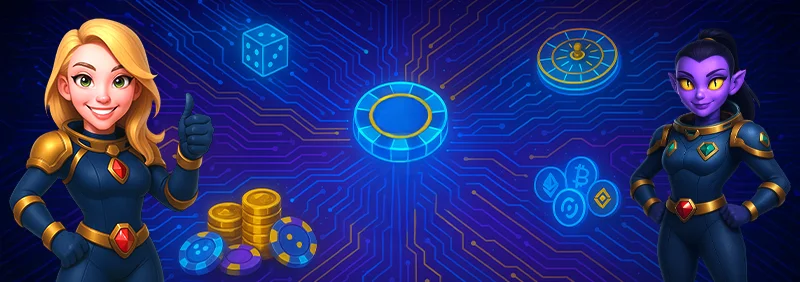Home > Casino Lab > Casino Web3 > DAO Casinos Explained: How Community-Owned Gambling Works
DAO Casinos Explained: How Community-Owned Gambling Works
The iGaming industry has always been defined by centralization. Traditional casinos—whether land-based or online—are operated by companies that control the games, payouts, and business decisions. But with the rise of blockchain technology and decentralized autonomous organizations (DAOs), this model is being challenged.
DAO casinos propose a radically different vision: one where the casino is not owned by a corporation but by its community of players and token holders. This concept of community-owned gambling could redefine the power dynamics of the industry and transform how casinos are built, governed, and experienced.

What Is a DAO and How Does It Apply to Casinos?
A DAO, or Decentralized Autonomous Organization, is a structure that operates through smart contracts on the blockchain. Instead of a board of directors or executives making decisions, governance is handled collectively by members who hold governance tokens. Each token represents voting power, allowing participants to shape the rules, policies, and even future development of the platform.
In the context of online casinos, DAOs enable players to directly influence the operation of the platform. From adjusting payout structures to approving new games or determining marketing strategies, decisions are made transparently and democratically. This creates a player-centric ecosystem where the community has a stake not just in playing, but in managing and profiting from the casino itself.
The Benefits of DAO Casinos
DAO casinos bring several advantages that challenge the traditional gambling model. The most significant is ownership and profit sharing. Instead of all revenue going to a central operator, DAO casinos distribute profits to token holders, aligning incentives between the platform and its players.
Another key benefit is transparency. Since operations are governed by smart contracts and voting processes recorded on the blockchain, there is little room for manipulation. Players can verify how funds are used, how decisions are made, and how payouts are distributed.
Finally, DAOs foster community engagement. By giving players a voice, casinos create a sense of belonging and loyalty. This not only strengthens the platform’s sustainability but also transforms players from passive consumers into active participants in the casino’s success.
Challenges and Risks of DAO-Based Gambling
Despite their promise, DAO casinos face important challenges. Regulation is a major concern, as most jurisdictions are not prepared to handle community-owned platforms that lack centralized management. Questions arise about who is legally responsible if disputes occur or if regulations are violated.
Technical complexity is another barrier. While blockchain-savvy users may understand voting systems, staking mechanisms, and governance tokens, mainstream players may find DAO structures intimidating or confusing.
There is also the issue of governance efficiency. While community voting ensures fairness, it can also slow down decision-making. Without clear leadership, DAOs risk falling into gridlock or being dominated by large token holders with disproportionate influence.
The Future of Community-Owned Casinos
Despite these challenges, DAO casinos represent a powerful vision for the future of iGaming. They embody the broader shift toward Web3, where decentralization and community-driven ecosystems replace corporate control. As technology matures and regulators adapt, DAO casinos could become a mainstream alternative, particularly for players who value transparency, fairness, and ownership.
In the coming years, we may see hybrid models emerge—casinos that blend DAO governance with professional management, combining efficiency with community trust. Ultimately, DAO casinos highlight the potential of player empowerment in an industry long dominated by centralized operators.
Conclusion
DAO casinos are more than a technological experiment—they are a new model of ownership and governance in online gambling. By turning players into stakeholders, aligning incentives, and ensuring transparency, DAOs could fundamentally change how casinos are designed and experienced. While risks remain, particularly around regulation and governance, the rise of community-owned gambling reflects the spirit of Web3: power to the players.
The casino of the future may not have a single owner—it may belong to its community.

